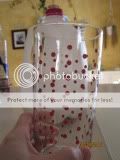Zoom-boing
Platinum Member
- Thread starter
- #61
So the water that drains and go back to the treatment plant, gets treated, nearly all of the water comes out the other end clean, but they ban it.
I worked in a wastewater treatment lab for two years. The cleaning of wastewater is a biological process. The treated water is briefly shocked with chlorine after treatment and then de-chlorinated - which is the only chemical process in the whole cycle, and there is no way to remove the phosphates... only to test for their levels and alert the state if they get too high. Excess phosphorous is very dangerous in freshwater (wastewater plants discharge "clean" effluent water back into rivers and streams), as it causes algae blooms that can kill the streams and all life in it. So you have to wash your dishes by hand to protect our important sources of fresh water? Boo effing hoo. Typical ignorant American...
And yes, big agra is also responsible for a huge dead zone in the ocean south of the Mississippi, but they are a giant corporation who control government legislation through lobbyist $$$ (Monsanto and Cargilll are two of the most evil corporations in existence), so they can do pretty much what they want. No one cares as long as you have shiny dishes, right?
Gulf Wildlife 'Dead Zone' Keeps Growing : Discovery News
So how much phosphate gets cleaned out and how much gets dumped into waterways from households, cause your link only talks about big corp crap.
Outside of widespread impacts from oil release, the drainage of the Mississippi River into the Central Gulf has deposited massive amounts of agricultural chemicals and fertilizers from agricultural activities in the Central United States
And big corp gets to do whatever they want while joe taxpayer gets crap. Got it.
I understand the problem but have yet to see facts about how much phosphates from households, specifically dishwashing detergent, are contributing to the problem.
And your damn straight I'll bitch about it when I'm paying for a product that makes my stuff look and feel like shit. Wash it by hand? Ah yes, so then the greenies will go after the energy and water overuse from that.
Last edited:






